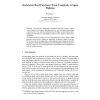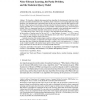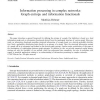10054 search results - page 52 / 2011 » On the Complexity of Function Learning |
110
click to vote
FSTTCS
2003
Springer
15 years 7 months ago
2003
Springer
A key idea in cryptography is using hard functions in order to obtain secure schemes. The theory of hard functions (e.g. one-way functions) has been a great success story, and the ...
171
Voted
STOC
2000
ACM
15 years 7 months ago
2000
ACM
We describe a slightly subexponential time algorithm for learning parity functions in the presence of random classification noise, a problem closely related to several cryptograph...
138
click to vote
GECCO
2003
Springer
15 years 7 months ago
2003
Springer
Abstract. Our ability to simultaneously measure the expression levels of thousands of genes in biological samples is providing important new opportunities for improving the diagnos...
99
Voted
AMC
2008
15 years 2 months ago
2008
This paper introduces a general framework for defining the entropy of a graph. Our definition is based on a local information graph and on information functionals derived from the...
179
Voted
CC
2010
Springer
15 years 27 days ago
2010
Springer
Abstract. We prove lower bounds on the randomized two-party communication complexity of functions that arise from read-once boolean formulae. A read-once boolean formula is a formu...



